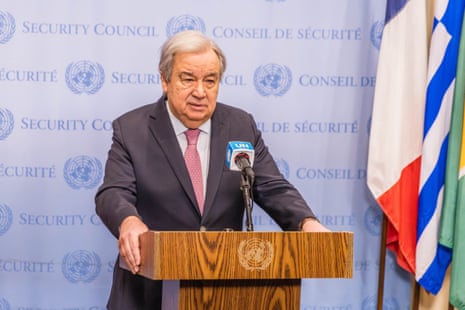UN secretary general says Gaza transformed into ‘killing field’
United Nations (UN) secretary general António Guterres said on Tuesday that Gaza had become “a killing field” because Israel has continued to block aid, an accusation an Israeli official quickly denied, saying there was “no shortage” of aid, reports Agence France-Presse (AFP).
“More than an entire month has passed without a drop of aid into Gaza. No food. No fuel. No medicine. No commercial supplies. As aid has dried up, the floodgates of horror have re-opened,” Guterres said in remarks to journalists.
Pointing to the Geneva conventions governing the treatment of people in war, Guterres emphasised the obligation of the “occupying power” to ensure the provision of food and medical supplies to the population. “None of that is happening today. No humanitarian supplies can enter Gaza,” Guterres said.
According to AFP, Israeli ministry of foreign affairs spokesperson Oren Marmorstein rejected the allegations, saying there was “no shortage of humanitarian aid in the Gaza Strip.” Marmorstein further alleged that Hamas has used recent aid to Gaza to “rebuild its war machine.”
Guterres also referenced recent Israeli proposals over controlling aid into Gaza, which a UN source told AFP included monitoring calories to prevent misuse by Hamas.
“The Israeli authorities newly proposed ‘authorization mechanisms’ for aid delivery risk further controlling and callously limiting aid down to the last calorie and grain of flour,” he told reporters at UN headquarters in New York.

“Let me be clear – we will not participate in any arrangement that does not fully respect the humanitarian principles – humanity, impartiality, independence and neutrality,” Guterres said, demanding guarantees for the unhindered entry of aid to the coastal territory.
Guterres also raised the alarm about the situation in the West Bank. “The current path is a dead end – totally intolerable in the eyes of international law and history,” he said.
He added:
And the risk of the occupied West Bank transforming into another Gaza makes it even worse.
It is time to end the dehumanisation, protect civilians, release the hostages, ensure lifesaving aid, and renew the ceasefire.”
Key events
An Israeli airstrike killed at least 18 Palestinians in a house in Shejaia in Gaza City, local health authorities said, reports Reuters.
Medics said dozens of others were injured in the attack that hit a multi-floor residential building in the eastern suburb of Gaza City. There was no immediate comment from the Israeli army, according to Reuters.
Last week, the military ordered Shejaia residents to evacuate, saying forces intended to operate against militants in the area.
Iran says talks with US will be indirect, contrary to Trump’s words

Patrick Wintour
Iran, wrongfooted by Donald Trump’s revelation that “direct talks” between the US and Iran on its nuclear programme are set to start in Oman on Saturday, insisted the talks would actually be in an indirect format, but added that the intentions of the negotiators were more important than the format.
Trump on Monday threw Tehran off guard by revealing the plan for the weekend talks and saying that if the talks failed Iran would be in “great danger”. There has been an unprecedented US military buildup across the Middle East in recent weeks, and Trump’s decision to make the talks public looks designed to press Iran to negotiate with urgency.
The US delegation to the talks will be led by Steve Witkoff, Trump’s special envoy to the Middle East, who has also been involved in talks with Russia over the Ukraine war; and the Iranian side by its foreign minister, Abbas Araghchi. Witkoff’s efforts to broker peace between Israel and Hamas and between Russia and Ukraine have so far failed.
Iran had in public been stalling about talks, saying simply that it was prepared for indirect talks with the US, but had not yet received a formal response from the US as to whether talks were going ahead. In a post on X issued some hours after Trump used an Oval Office press conference to reveal the agreement to stage weekend talks, Araghchi described the talks as an opportunity and a test. He insisted the ball was in the US’s court.
Speaking during a visit to Algiers, Araghchi elaborated that Iran wanted indirect talks. He said:
The form of negotiations is not important, whether they are direct or indirect. In my opinion, what is important is whether the negotiations are effective or ineffective, whether the parties are serious or not in the negotiations, the intentions of the parties in the negotiations, and the will to reach a solution. These are the criteria for action in any dialogue.”
He added Iran had not agreed on any formula that would allow indirect talks to convert into direct talks, but the US expects the talks to evolve into a direct negotiation. Ayatollah Ali Khamenei, Iran’s supreme leader, has vetoed direct talks in protest at US sanctions and in deference to hardliners that believe talks with the US over Tehran’s nuclear programme are a political trap.
US defence secretary Pete Hegseth, speaking in the Oval Office on Monday during a visit by Israeli prime minister Benjamin Netanyahu, warned that the US was “not going to relent” in its campaign targeting the Houthis.
“So we have a lot more options and a lot more pressure to apply,” Hegseth said. “And we know, because we see the reports, how devastating this campaign has been in them. And we will not relent.”
An Associated Press (AP) review has found the new US operation against the Houthis under president Donald Trump appears more extensive than those under former president Joe Biden, as Washington moves from solely targeting launch sites to firing at ranking personnel and dropping bombs on cities.
The new campaign of airstrikes started after the rebels threatened to begin targeting “Israeli” ships again over Israel blocking aid entering the Gaza Strip. The rebels have loosely defined what constitutes an Israeli ship, meaning many vessels could be targeted, reports the AP
The Houthis targeted more than 100 merchant vessels with missiles and drones, sinking two of them and killing four sailors from November 2023 until January of this year. They also launched attacks targeting US warships without success.
The US campaign shows no signs of stopping, as the Trump administration has linked its airstrikes on the Houthis to an effort to pressure Iran over its rapidly advancing nuclear program as well.
Suspected US airstrikes pounded the area around Yemen’s Red Sea port city of Hodeida on Tuesday night, killing at least six people, the Iran-backed Houthi rebels said, according to the Associated Press (AP).
The strikes hit around Hodeida’s al-Hawak district, the rebels said, and injured 16 people. The area is home to the city’s airport, which the rebels have used in the past to target shipping in the Red Sea, reports the AP.
Since its start, the intense campaign of US airstrikes targeting the rebels over their attacks on shipping in Middle East waters – related to the Israel-Hamas war – has killed at least 79 people, according to casualty figures released by the Houthis.
The AP reports that footage aired by the rebels’ al-Masirah satellite news channel showed chaotic scenes of people carrying the injured to waiting ambulances and rescuers searching by the light of their mobile phones. The target appeared in the footage to be a home in a residential neighbourhood, likely part of a wider campaign launched by the Trump administration to kill rebel leaders.
Other strikes targeted Yemen’s mountainous Amran governorate, north of the rebel-held capital of Sana’a. There, the Houthis described US strikes hitting telecommunication equipment. Previous US strikes also targeted telecommunications gear in Amran near Jebel Aswad.
Strikes later apparently targeted Jebel Nuqum near Sana’a. Others hit Dhamar and Ibb governorates, injuring three people, reports the AP.
The US military’s Central Command (Centcom), which oversees US military operations, did not immediately acknowledge the strikes, according to the news agency. That follows a pattern for the command, which now has authorisation from the White House to conduct strikes at will in the campaign that began on 15 March.
The US military also has not been providing any information on targets hit in the campaign. The White House has said more than 200 strikes have been conducted so far.
As calls for Lebanon’s Hezbollah to disarm gain momentum, a senior Hezbollah official told Reuters the group is ready to hold talks with the Lebanese president about its weapons if Israel withdraws from south Lebanon and stops its strikes.
US-backed president Joseph Aoun, who vowed when he took office in January to establish a state monopoly on the control of arms, intends to open talks with Hezbollah over its arsenal soon, three Lebanese political sources told Reuters.
Hezbollah emerged severely weakened from the 2024 conflict with Israel when its top leaders and thousands of its fighters were killed and much of its rocket arsenal destroyed. The blow was compounded when its ally Bashar al-Assad was toppled from power in Syria, cutting its supply lines from Iran, reports Reuters.
The senior Hezbollah official told the news agency that the group was ready to discuss its arms in the context of a national defence strategy but this hinged on Israel pulling out its troops from five hilltops in south Lebanon.
“Hezbollah is ready to discuss the matter of its arms if Israel withdraws from the five points, and halts its aggression against Lebanese,” the senior official told Reuters.
Hezbollah’s position on potential discussions about its arms has not been previously reported. The sources spoke to Reuters on condition of anonymity due to political sensitivities. Hezbollah’s media office did not immediately respond to a request for comment and the presidency declined to comment, it added.
Israel, which sent ground troops into south Lebanon during the war, has largely withdrawn but decided in February not to leave the five hilltop positions. It said it intended eventually to hand them over to Lebanese troops once it was sure the security situation allowed.
The mother of an Israeli soldier held hostage in Gaza told Agence France-Presse (AFP) that she fears that Israel’s renewed bombardment of the territory puts his life at even greater risk.
“Our children are in danger,” Herut Nimrodi told AFP during an interview. Her son, Tamir, was 18 when he was taken to Gaza on 7 October 2023. “We don’t know much, but one thing that is certain is that military pressure on Gaza endangers the hostages,” she said.
Of the 251 hostages seized during Hamas’s unprecedented attack on Israel, 58 are still held in Gaza, including 34 the Israeli military says are dead.
A truce that lasted from 19 January to 17 March led to the return of 33 Israeli hostages – eight of them in coffins – in exchange for the release of about 1,800 Palestinian prisoners held by Israel.
But on 18 March, after weeks of disagreement with Hamas over how to extend the ceasefire, Israel resumed large-scale military operations in the Gaza Strip, beginning with heavy bombardments.
Tamir, a soldier with Cogat, the Israeli military body that oversees civilian affairs in the Palestinian territories, sent his mother a message on 7 October about the thousands of rockets that Hamas began launching at dawn that day. He was taken hostage 20 minutes later, along with two other soldiers killed two months later inside Gaza, under unknown circumstances, reports AFP.
Israeli prime minister Benjamin Netanyahu and his government insist that increased military pressure is the only way to force Hamas to release the hostages, dead or alive.
“For a year and a half, that hasn’t worked. What’s worked is negotiations and pressure [from US President Donald Trump],” said Nimrodi, accusing Israel of not prioritising the return of the hostages.
Tamir, who turned 20 in captivity, is one of 24 hostages believed to be alive, though no proof of life has been sent since his abduction.
His mother regularly joins other hostage families at rallies in Tel Aviv, though they do not all agree on the best strategy to secure their return, reports AFP. Some, like Tzvika Mor, whose son was abducted at the Nova music festival, believe that strength rather than negotiation is the way to proceed.
“Hamas will never free the hostages out of the goodness of their heart and without military pressure,” he said. A founder of the Tikva forum – which means “hope” in Hebrew – Mor said, “every time Hamas says ’time out’, the government negotiates instead of increasing pressure to free all hostages at once”.
Indonesia offers to temporarily shelter injured and orphaned Palestinians from Gaza
Indonesian president Prabowo Subianto said on Wednesday that his country will offer temporary shelter to Palestinian medical evacuees and children orphaned by the Israel-Hamas war in Gaza.
“We are ready to evacuate those who are injured or traumatised, and orphans, if they want to be evacuated to Indonesia, and we are ready to send planes to transport them,” Subianto said, adding that he has instructed his foreign affairs minister to discuss evacuation plans with the Palestinian authorities at once.
According to the Associated Press (AP), he said Indonesia is ready to evacuate a first group of about 1,000 victims, who will stay in the country until they have fully recovered from their injuries and Gaza is safe enough to return to. Subianto said the move was not for permanent resettlement.
Subianto spoke before getting on a flight to Abu Dhabi, the first stop in a weeklong tour of the Middle East that also includes stops in Turkey, Egypt, Qatar and Jordan. He said he would consult on the planned evacuations with those countries, some of which have also accepted Palestinians for humanitarian reasons, reports the AP.
He added that other countries have called on Indonesia to increase its role in seeking a resolution to the conflict in Gaza. The world’s most populous Muslim-majority nation has long been a strong supporter of the Palestinians.
“This is something complicated; it’s not easy, but I think it encourages the Indonesian government to play a more active role,” Subianto said.
UN secretary general says Gaza transformed into ‘killing field’
United Nations (UN) secretary general António Guterres said on Tuesday that Gaza had become “a killing field” because Israel has continued to block aid, an accusation an Israeli official quickly denied, saying there was “no shortage” of aid, reports Agence France-Presse (AFP).
“More than an entire month has passed without a drop of aid into Gaza. No food. No fuel. No medicine. No commercial supplies. As aid has dried up, the floodgates of horror have re-opened,” Guterres said in remarks to journalists.
Pointing to the Geneva conventions governing the treatment of people in war, Guterres emphasised the obligation of the “occupying power” to ensure the provision of food and medical supplies to the population. “None of that is happening today. No humanitarian supplies can enter Gaza,” Guterres said.
According to AFP, Israeli ministry of foreign affairs spokesperson Oren Marmorstein rejected the allegations, saying there was “no shortage of humanitarian aid in the Gaza Strip.” Marmorstein further alleged that Hamas has used recent aid to Gaza to “rebuild its war machine.”
Guterres also referenced recent Israeli proposals over controlling aid into Gaza, which a UN source told AFP included monitoring calories to prevent misuse by Hamas.
“The Israeli authorities newly proposed ‘authorization mechanisms’ for aid delivery risk further controlling and callously limiting aid down to the last calorie and grain of flour,” he told reporters at UN headquarters in New York.
“Let me be clear – we will not participate in any arrangement that does not fully respect the humanitarian principles – humanity, impartiality, independence and neutrality,” Guterres said, demanding guarantees for the unhindered entry of aid to the coastal territory.
Guterres also raised the alarm about the situation in the West Bank. “The current path is a dead end – totally intolerable in the eyes of international law and history,” he said.
He added:
And the risk of the occupied West Bank transforming into another Gaza makes it even worse.
It is time to end the dehumanisation, protect civilians, release the hostages, ensure lifesaving aid, and renew the ceasefire.”



